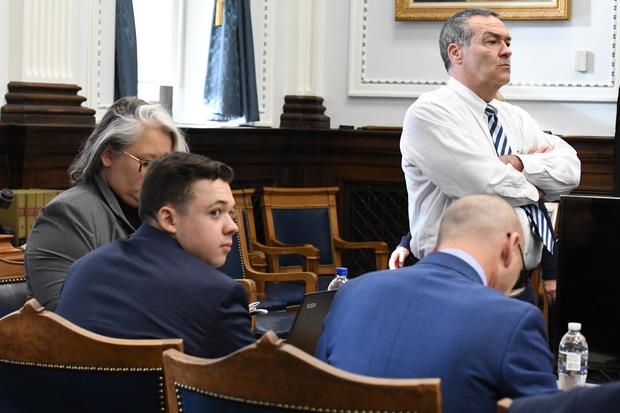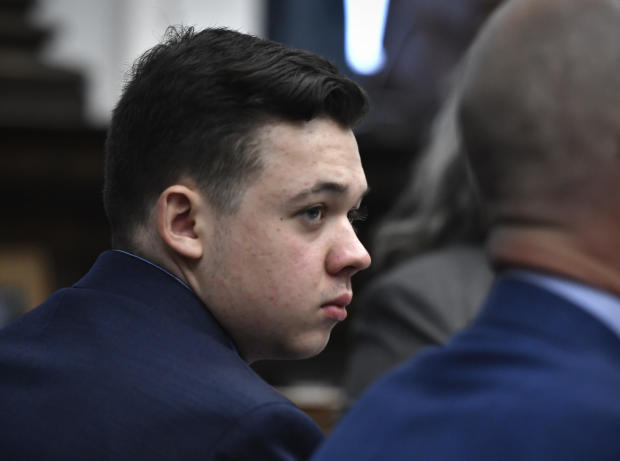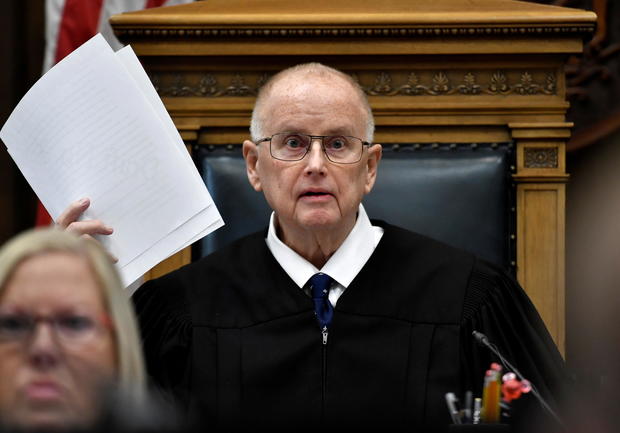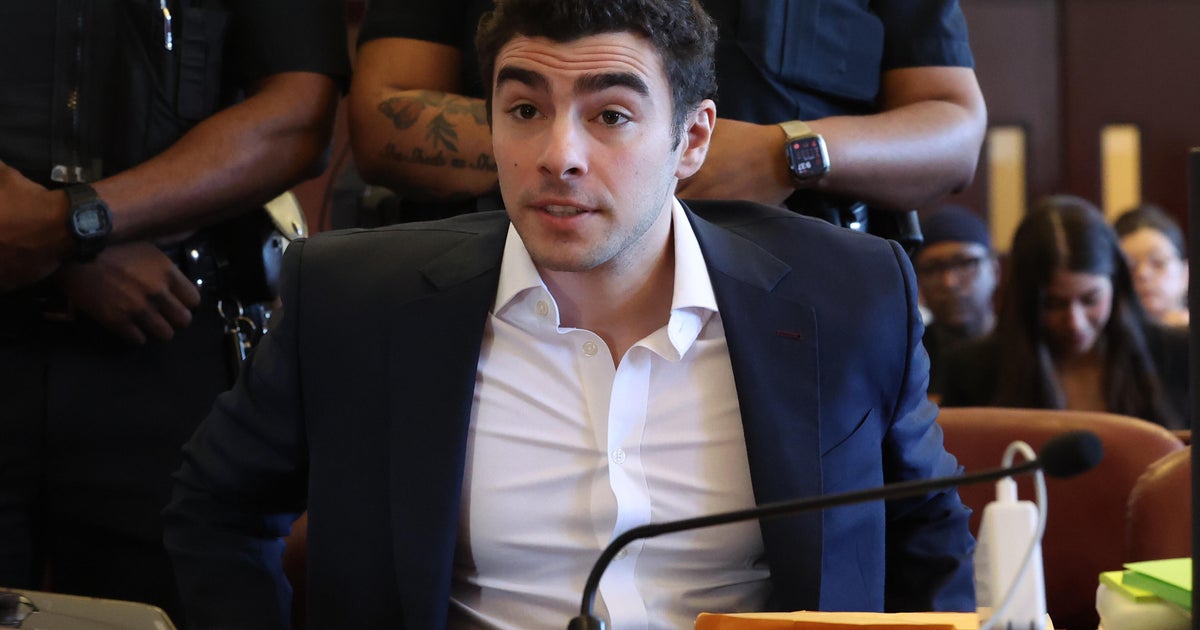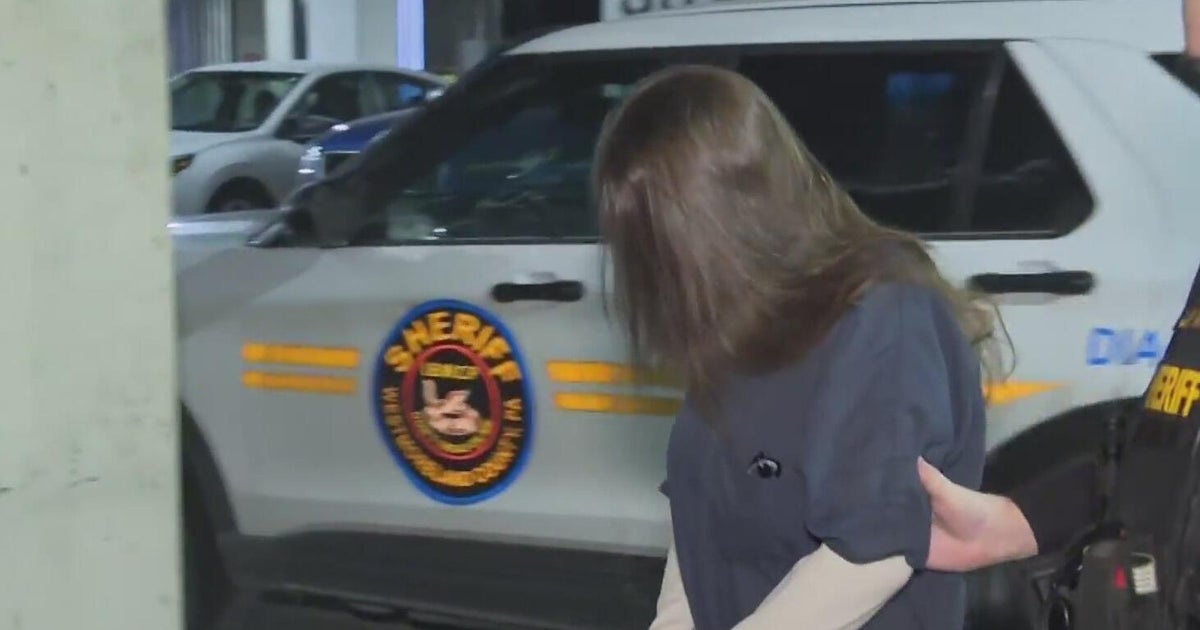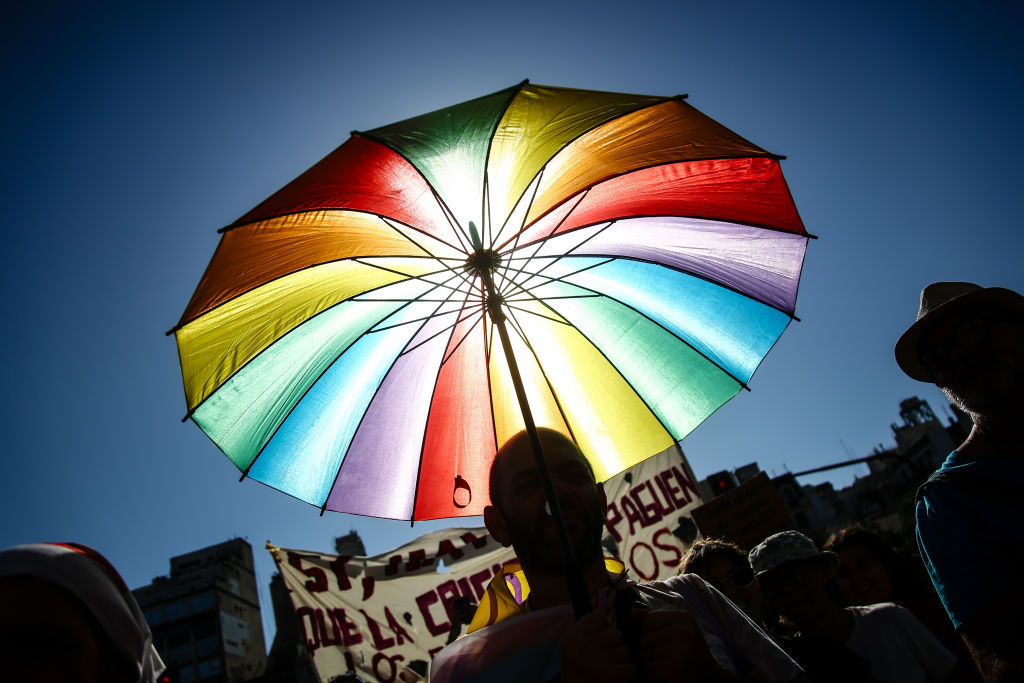Closing arguments in Kyle Rittenhouse trial focus on claim of self-defense
Prosecutors and defense lawyers in the trial of Kyle Rittenhouse delivered their closing arguments on Monday, and the case has now gone to the jury. Rittenhouse, 18, is charged with killing two men and wounding a third at a protest in Kenosha, Wisconsin, in August 2020.
Rittenhouse, who was 17 at the time of the shooting, said he went to Kenosha from his home in Antioch, Illinois, armed with an AR-15 style rifle, to help protect local businesses and provide first aid as protests over the police shooting of Jacob Blake devolved into civil unrest.
He and his attorneys claim he was acting in self-defense when he shot and killed Joseph Rosenbaum and Anthony Huber and wounded Gaige Grosskreutz. "I didn't do anything wrong, I was defending myself," Rittenhouse testified last week.
Prosecutors focused their closing arguments on disputing that claim of self-defense. The state described Rittenhouse as an aggressor, a liar, and an "active shooter" who did not face imminent threat of great bodily harm or death but instead posed such a threat to others.
"It's not up for Mr. Rittenhouse to be the judge, the jury and eventually the executioner," Assistant District Attorney James Kraus told the jury. "The only imminent threat that night was Mr. Rittenhouse."
The defense, however, maintained that Rittenhouse's actions were protected under the law and described the threat they said he faced from rioters. They accused the district attorney's office of rushing to judgment, questioning whether the police were under "pressure" to make an arrest.
"Ladies and gentlemen, this is a political case," defense attorney Mark Richards told the jury. "We can take politics out of it, as in Democrat and Republican, but the district attorney's office is marching forward with this case because they need somebody to be responsible. They need somebody to put and say, we did it, he's the person who brought terror to Kenosha."
Both sides made use of video from the scene to back up their version of events. The burden of proof in the case is on prosecutors to prove that the shootings were not justified.
Rittenhouse is charged with multiple counts, including first-degree intentional homicide. If convicted of the most serious charge, he would face life in prison. The judge has indicated he will also allow the jury to consider lesser charges. A misdemeanor weapons possession count was dropped by the judge Monday morning.
State rebuts self-defense claim: "It is not reasonable"
Upon a return from the break, Assistant District Attorney James Kraus presented the state's rebuttal.
"You don't just immediately get to shoot someone," Kraus said. "It is not reasonable for any adult … 17-year-old male, to not try to defend yourself first using other methods."
Things heated up further when the defense objected to the mention of Joshua Ziminski and his wife, who were not called as witnesses in the trial. Joshua Ziminski has been separately charged by the district attorney's office with disorderly conduct after firing a shot heard just moments before Rittenhouse fatally shot Joseph Rosenbaum.
The jury was asked to step out twice as the parties discussed his Fifth Amendment rights. Ziminski's trial is set to take place in January.
When the jurors returned, Kraus continued by addressing the "supposed threat" Rosenbaum posed to Rittenhouse, noting that the verbal threat is never heard, and the defense and the defendant are in disagreement about where and when it exactly happened.
Returning to the video showing the parking lot where Rittenhouse shot Rosenbaum, Kraus disputed the defense's characterization that the teen was blocked in by a "wall" of people, showing on the monitors open space where, Kraus said, if he went, "everyone would be alive and everyone would be fine."
"He did not exhaust his duty to retreat, he did not exhaust all of his options," Kraus told the jury.
"Videos don't lie, but we know Kyle Rittenhouse does," Kraus said. "He lied all that night."
"We know that Mr. Rittenhouse was going around that night trying to be a paramedic, a policeman, and a fireman, without receiving any real training in any of them. Pretty hard to do all three," Kraus told the jury. "He's a chaos tourist."
Kraus reminded the jury that the standard for self-defense is imminent threat of great bodily harm or death, and he said Rittenhouse faced no such threat. "It's not up for Mr. Rittenhouse to be the judge, the jury and eventually the executioner," he said
"The only imminent threat that night was Mr. Rittenhouse," Kraus concluded. "He is guilty."
Judge Bruce Schroeder then informed the jury that they are charged with weighing the evidence and implored them to return "just and true verdicts." He said they would break for the night and begin deliberations in the morning at 9 a.m. Central Time (10 a.m. ET).
Defense: "Rittenhouse's behavior was protected" under Wisconsin law
Defense attorney Mark Richards walked the jury through the video showing the moments after the first shooting, and direct the jury's attention to a "wall" of people crowded around the parking lot. When the crowd disperses after Rittenhouse shoots Rosenbaum, Richards notes that a mob has now formed and starts chasing him.
"Kyle is zero threat to anyone," Richards says as video shows his client running away, calling the state's characterization of the teen being an active shooter "B.S."
Richards told the jury that the prosecution "must live in fairytale land… unfortunately that's not how the real world works. This was real world."
"Ladies and gentlemen, that's the case. There was no threatening behavior that started this. Mr. Rosenbaum was hell bent on causing trouble that night," Richards said, once again placing the onus for the violence on the man Rittenhouse shot. "But Kyle Rittenhouse's behavior was protected under the law of the state of Wisconsin."
Richards said his client did not need to have suffered great bodily harm via a physical beating for his reaction to be justified, saying that Rittenhouse shot Rosenbaum because Rosenbaum attacked him.
"Kyle Rittenhouse's conduct on August 25th was privileged based upon the actions of Mr. Rosenbaum and others," Richards concluded. "I ask you to do this, do justice here under the law of the state of Wisconsin."
After the defense concluded the judge excused the jury for a 10 minute recess.
Defense maintains that Rittenhouse acted in self-defense
As defense attorney Mark Richards continued his closing arguments, he asked the jury to use their common sense and find that his client was not the aggressor in this situation, as the state suggests, but someone who put an end to what he viewed to be the real threat that night: Joseph Rosenbaum.
"Ladies and gentlemen, facts and truth matter," Richards told the jury.
Richards maintains that Rittenhouse shot Rosenbaum four times in order to stop a threat to his person, going as far to say he is "glad" his client shot him, noting that he was "irrational and crazy."
"My client didn't shoot anyone until he was chased and cornered," Richards said of the Rosenbaum shooting.
Briefly remarking on prosecutors highlighting Rittenhouse's use of full metal jacket bullets that night versus other types that can commonly be used in a AR-15, Richards told the jury, "Bullets are bullets. … They wreak havoc on a body and they kill people."
Richards described the crowd around Rittenhouse that night: "They were rioters. They weren't demonstrators," noting that there were legitimate demonstrations that night outside the courthouse. "These people were rioting."
"Ladies and gentlemen, this is a political case," Richards told the jury. "We can take politics out of it, as in Democrat and Republican, but the district attorney's office is marching forward with this case because they need somebody to be responsible. They need somebody to put and say, we did it, he's the person who brought terror to Kenosha."
"Kyle Rittenhouse is not that individual," he continued. "The rioters, the demonstrators who turned into rioters, those are the individuals who bring us forth."
Defense begins its closing argument, accuses state of "misrepresenting" video evidence
Lead defense attorney Mark Richards began his closing arguments by trying to discredit the state's case against his client, Kyle Rittenhouse.
At the outset, Richards accused prosecutors of "lying" or "misrepresenting" the video evidence when they claimed Rittenhouse was the one who provoked the violence that night in Kenosha.
"Ladies and gentlemen, this case is not a game. It's my client's life," Richards told the jury.
He referred to Joseph Rosenbaum, the first person fatally shot by Rittenhouse, as "a bad man" and " a rioter." And he told the jury, "my client had to deal with him that night, alone."
While prosecutors referred to Rittenhouse as an "active shooter," Richards challenged that characterization, noting that the "buzzword" carries "loaded connotations." He urged the jury to question whether, like an active shooter, Rittenhouse had intended on a multiple casualty event. Richards argued instead that Rosenbaum was the catalyst for the gunfire.
Richards described the second man who was killed, Anthony Huber, as "a rioter" who had pointed his "middle finger at police." Disputing the state's characterization of Huber, Richards emphasized that Huber hit Rittenhouse twice, including striking him in the head.
Richards noted that the third shooting victim, Gaige Grosskreutz, testified that he was concerned about the hits to Rittenhouse's head.
In response to the media coverage and the public discourse surrounding the case, Richards reminded the jury that they should only take into account what they've seen and heard in the courtroom.
"Ladies and gentlemen, this has been a rush to judgment," Richards told the jury. He questioned whether the police were under "pressure" to make an arrest.
Prosecutor: Excuses "are not legal justifications to kill"
Lead prosecutor Thomas Binger disputed the defense's claim that Joseph Rosenbaum verbally threatened Rittenhouse prior to the shooting, which he called the "crux" of their self-defense argument.
Binger told the jury that if the defense had video evidence of such a threat, they would have shown it, but such evidence does not exist. "The only important thing in this case that is not on video is the alleged threat to kill, which suggests it never really happened," Binger told the jury. He noted that they have been able to piece together much of Rittenhouse's timeline that night and have found no video evidence of any threat from Rosenbaum toward Rittenhouse.
Binger reminded the jury that they must decide whether Rittenhouse's actions were justified, and urged them not to believe what he called "pathetic excuses." Binger explained that excuses such as panicking "are not legal justifications to kill."
"No reasonable person would have done these things," Binger told the jury. "If you created the danger, you forfeit the right to self-defense."
Binger ended his closing arguments, which lasted about two hours, by asking the jury to find Rittenhouse guilty on all counts. The court excused the jury for a brief break before the defense's turn.
Prosecutor: Rittenhouse showed "no remorse"
Prosecutor Thomas Binger described Rittenhouse as a "quack" medic walking around with an AR-15 that he could not use to protect buildings or provide medical care, as he claimed to be there to do that night.
Binger said that by claiming to be an EMT when he wasn't, Rittenhouse "puts lives at risks."
"For him to call himself a medic is an insult," Binger said.
He conceded that during the night, Rittenhouse helped wrap an ankle and helped someone with a cut hand. "Yay!" Binger exclaimed sarcastically, quickly adding that those actions do not negate the two people he killed.
"I don't give you any credit. He showed no remorse for his victims," Binger said to the jury. "He broke down crying about himself, not about anybody that he hurt that night. No remorse."
Prosecutor focuses on Rittenhouse's "provocation"
After a lunch break, prosecutor Thomas Binger resumed closing arguments, showing videos of the moments after Joseph Rosenbaum was shot.
Binger described Rittenhouse's actions as "a provocation."
"The crowd is dealing with what they perceive to be an active shooter," he said.
Video shows other people in the crowd, including Richie McGinniss, running to Rosenbaum's aid. The prosecutor described Rittenhouse fleeing the scene, saying he "callously disregarding the body of the man he just shot and killed."
Footage from the moments afterwards show Rittenhouse running away and saying "he had a gun," although Rosenbaum was unarmed.
Binger explained that after Rittenhouse shot Rosenbaum, the crowd had a right to protect themselves from an active shooter, and in this case they used the "least intrusive" means possible.
Noting that Gaige Grosskreutz had a handgun on him, Binger said Grosskreutz and the crowd would have been within their rights to have used deadly force against Rittenhouse. When he testified earlier in the trial, Grosskreutz, who was shot in the arm by Rittenhouse, said that was a decision he was not prepared to make.
Binger compared Grosskreutz's actions to those of Rittenhouse, pointing out that Grosskreutz decided not to shoot Rittenhouse at that moment, while Rittenhouse did so quickly and "seemingly very easily."
The prosecutor then described Rittenhouse walking away from the scene after the shooting, "like he's some sort of hero in a Western."
Showing the jury a video of Grosskreutz after the shooting, Binger said, "It's hard to look at, but this is what we're dealing with." He added, "Let's not flinch away from this. It's important we understand what that gun was capable of that night."
State begins closing arguments, disputing self-defense claim
Lead prosecutor Thomas Binger began his closing argument by noting that there has been quite a bit of "noise and a lot of static surrounding" this case. He reminded the jury that they swore they came into this case with no preconceived notions and promised to keep an open mind in order to make a decision based on the evidence.
"This is a case where a 17-year-old teenager killed two unarmed men and injured a third," Binger said.
While walking the jury through the timeline of events, Binger began with the first fatal shooting. He replayed video from the scene and described what he called Rittenhouse's provocation of Joseph Rosenbaum as Rittenhouse moved through the street carrying an AR-15.
"If you are the one that is threatening others, you lose the right to claim self-defense," Binger stated.
Rosenbaum was shot four times. Binger described how he became incapacitated after the first shot hit him in the pelvis. Binger showed the jury that the second shot went through Rosenbaum's hand, the third grazed his scalp, and the fourth, which he refers to as "the kill shot," went through his back.
Binger disputed what he called the defense's "cockamamie theory" that Rosenbaum tried to take Rittenhouse's gun and intended to use it to shoot him, explaining that due to his injuries, it would have been impossible for Rosenbaum to seize the gun.
"He is helpless, he is vulnerable," Binger said.
Describing Rittenhouse's actions, Binger told the jury, "You cannot claim self-defense against a danger you create. That's critical right here."
"He doesn't get a pass by pulling the trigger fast," Binger continued, arguing that Rittenhouse is responsible for each bullet out of the gun. "He controls how quickly he pulls the trigger. He is in control of that decision-making process. No one else made him do that."
Before breaking for lunch, the prosecutor indicated that he wanted to show further footage but was having technical issues. Court will resume at 12:45 p.m. Central Time (1:45 p.m. ET).
Judge in Rittenhouse case delivers instructions to the jury
Kenosha County Circuit Court Judge Bruce Schroeder delivered a series of instructions to the jury Monday morning. The court had previously anticipated that relaying the instructions to the jury would take about 45 minutes to an hour.
One of the first instructions to the jury was that they should disregard Count 6 of the indictment, as moments earlier the court dismissed the misdemeanor gun charge against Rittenhouse.
The judge also defined self-defense to the jury, explaining how that plays a role in the charges.
While explaining lesser charges to the jury, the judge stopped mid-sentence and excused the jury. Then the parities debated the instructions as to second-degree homicide.
Lesser charges give the jury an option to convict on a less serious charge than that already pending from the indictment. Judge Schroeder explained that the jury must make a decision on the initial charge first, prior to considering the lesser charges, and they can only return one verdict per charged count.
When the jury was called back into the courtroom, the judge clarified that if they determine Rittenhouse acted lawfully in self defense the initial count, they do not have to go further and consider the lesser charges.
When the judge has finished reading the instructions, he indicated he plans to take a short break, and when they return the jury will hear closing arguments from both the defense and the state.
Each side will have a total time of two and a half hours to make their cases to the jury for the last time, before the jurors head into deliberations.
The state said their initial closing arguments will take about two hours, and agreed to pause for a lunch break during their allotted time.
Judge dismisses gun charge against Rittenhouse
Judge Bruce Schroeder dismissed Count 6 of the indictment against Kyle Rittenhouse on Monday morning.
Count 6 was a misdemeanor charging Rittenhouse with possession of a dangerous weapon by a person under 18. That count carried a maximum sentence of 9 months in prison and a $10,000 fine.
He still is charged with five counts, including first-degree intentional homicide.
Kenosha prepares for verdict
Kenosha has said it's prepared for potential unrest ahead of a verdict in the case. Governor Tony Evers said 500 National Guard members would be available if local law enforcement requested them.
CBS News spoke to Rittenhouse's mother, Wendy, who says her son only went there to help people.
"If he had to do it all over again, he probably would not go down to Kenosha. Kyle's nature is to help people," Wendy Rittenhouse said. Asked if he regrets going to the protest that night, she said, "Yeah, he does."
Watch more in the video below from "CBS Mornings."
What are the charges?
Count 1: First-degree reckless homicide, use of a dangerous weapon
Count 2: First-degree recklessly endangering safety, use of a dangerous weapon
Count 3: First-degree intentional homicide, use of a dangerous weapon
Count 4: Attempt first-degree intentional homicide, use of a dangerous weapon
Count 5: First-degree recklessly endangering safety, use of a dangerous weapon
Count 6: Possession of a dangerous weapon by a person under 18. This count was dropped by Judge Bruce Schroeder ahead of jury instructions on Monday.
If convicted of the intentional homicide charge, Rittenhouse would face life in prison.
